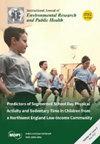父母的心理控制与台湾青少年和即将成年者的冒险行为:作为中介的利益认知
3区 综合性期刊
Q1 Medicine
International Journal of Environmental Research and Public Health
Pub Date : 2024-09-13
DOI:10.3390/ijerph21091207
引用次数: 0
摘要
青少年的冒险行为因其普遍性和潜在的不良后果而成为重要的公共卫生问题,这就强调了研究和预防策略的必要性,以促进青少年的健康成长。本研究通过对台湾高中生和大学生的利益认知,探讨了父母心理控制与冒险行为之间的关系。本研究采用横断面设计,对 378 名参与者进行了调查,以评估母亲和父亲的心理控制、利益认知和冒险行为参与度。结果显示,高中生和大学生在心理控制或利益认知方面没有明显差异。然而,大学生报告的冒险行为水平更高,如冒险驾驶、饮酒和无保护措施的性行为。母亲和父亲的心理控制与利益认知和冒险行为呈正相关。此外,利益认知在高中生和大学生的心理控制与冒险行为之间起到了中介作用。这些研究结果表明,父母的心理控制通过影响青少年对风险行为益处的认知,间接影响了青少年的风险行为。这项研究强调了促进支持自主的养育方式对减少冒险行为的重要性,并提倡在青少年和新成人中开展提高决策技能的计划。本文章由计算机程序翻译,如有差异,请以英文原文为准。
Parental Psychological Control and Risk-Taking among Taiwanese Adolescents and Emerging Adults: Benefit Perception as a Mediator
Youth risk-taking behaviors present important public health concerns due to their prevalence and potential adverse consequences, underscoring the need for research and prevention strategies to promote youth’s healthy development. The present research examined the relationship between parental psychological control and risk-taking behaviors via benefit perception among high school and college students in Taiwan. Using a cross-sectional design, the study surveyed 378 participants to assess maternal and paternal psychological control, benefit perception, and engagement in risk-taking behaviors. Results indicated no significant difference in psychological control or benefit perception between high school and college students. However, college students reported higher levels of risk-taking behaviors, such as risky driving, alcohol use, and unprotected sex. Both maternal and paternal psychological control positively correlated with benefit perception and risk-taking behaviors. Furthermore, benefit perception mediated the relationship between psychological control and risk-taking behavior among high school and college students. These findings suggested that parental psychological control indirectly influenced youth risk-taking by shaping their perceptions of the benefits of such behaviors. The study highlights the importance of promoting autonomy-supportive parenting to reduce risk-taking behaviors and advocates for programs that enhance decision-making skills among adolescents and emerging adults.
求助全文
通过发布文献求助,成功后即可免费获取论文全文。
去求助
来源期刊

International Journal of Environmental Research and Public Health
Medicine-Public Health, Environmental and Occupational Health
CiteScore
7.30
自引率
0.00%
发文量
14422
审稿时长
1 months
期刊介绍:
International Journal of Environmental Research and Public Health (IJERPH) (ISSN 1660-4601) is a peer-reviewed scientific journal that publishes original articles, critical reviews, research notes, and short communications in the interdisciplinary area of environmental health sciences and public health. It links several scientific disciplines including biology, biochemistry, biotechnology, cellular and molecular biology, chemistry, computer science, ecology, engineering, epidemiology, genetics, immunology, microbiology, oncology, pathology, pharmacology, and toxicology, in an integrated fashion, to address critical issues related to environmental quality and public health. Therefore, IJERPH focuses on the publication of scientific and technical information on the impacts of natural phenomena and anthropogenic factors on the quality of our environment, the interrelationships between environmental health and the quality of life, as well as the socio-cultural, political, economic, and legal considerations related to environmental stewardship and public health.
The 2018 IJERPH Outstanding Reviewer Award has been launched! This award acknowledge those who have generously dedicated their time to review manuscripts submitted to IJERPH. See full details at http://www.mdpi.com/journal/ijerph/awards.
 求助内容:
求助内容: 应助结果提醒方式:
应助结果提醒方式:


